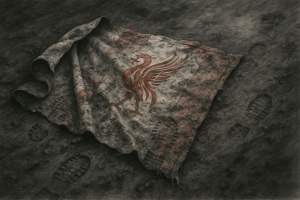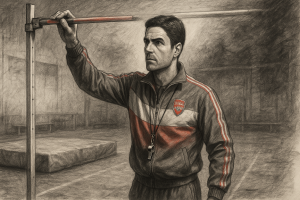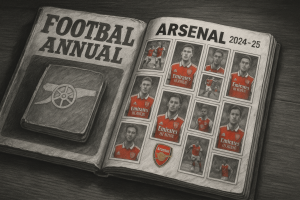So let us address — swiftly, soberly — the moment that has pricked the skin of sentiment, the moment that went beyond Anfield’s old red walls. The moment, indeed, when Trent Alexander-Arnold, Scouser, servant, son of the city, was met not with applause but with acrimony.
Booed.
On the occasion of his first appearance since the rumours turned real — that this summer, he shall leave. Not be sold. Not discarded. But walk away, on his terms. A contract run down, a chapter closed not by club nor coercion but by choice.
And how bitterly that choice was received.
I alluded to it briefly in the match review yesterday — but this, I think, demands more. Because it was sad. Because it was needless. Because, in truth, it lacked class.
Trent Alexander-Arnold did not force his way out. He has not behaved with arrogance, nor wielded the kind of blunt tools that so often define modern exits. He has merely made a decision. A personal one. A professional one. And, perhaps, a painful one.
Yes, Liverpool could have cashed in — Liverpool could have accepted a £20 million offer in January – recompense? But they didn’t. They chose not to. And now the beneficiary is the boy who once stood on the Kop, and then strode onto the turf.
There will be those who say, “He owes them.” But to what extent? Is a man forever bound to the club that raised him? Or is he permitted to grow, to dream, to diverge?
But — and here is the great truth of it — football is not a game of logic. It is an affair of the heart. Emotion is its lifeblood. Emotion makes broadcasters bid, makes sponsors salivate, makes heroes of ordinary men and devils of departing ones.
And so, when that emotion turns sour, when it becomes rage and rejection, can we truly be shocked?
To the Anfield reaction… Do I think it was right? No. It was beneath a club that is supposed to hold such high standards. Do I understand it? Regrettably, yes.
This is Liverpool — a monument of a football club, built on tradition, throbbing with history, swaddled in romance. But it is not without contradiction. This is a fanbase that defies monarchy but demands loyalty, that sings from the soul but sometimes shouts from the shadows. There is passion there, fierce and unyielding. And sometimes, it burns.

And so yes — there are times when speaking critically of Liverpool invites rebuke. When any questioning of its conduct feels like sacrilege. But even the greatest names — even the most storied banners — must be held to the standard they so proudly proclaim.
To boo Trent was to tarnish a tale that could have ended with dignity. It was not all fans. Of course not. But enough to sour the moment.
“You’ll Never Walk Alone” has never sounded so hollow and meant so little.
And though I have often taken pleasure in the theatre of rivalry, in the jabs and jests that make this game so deliciously tribal — I find no pleasure here.
Because this, I believe, was wrong.
A son of the city, met not with gratitude, but with grudge.
And that — above all — is a shame.
To Arsenal, then.
To a fiery full-time flashpoint in the aftermath of an afternoon that asked questions of spirit, of steel, and of standards. And at its centre, Mikel Arteta — not so much speaking as seething. Spitting feathers, they said. But it was more than that. The man was vibrating with fury — still riding the tremors of a stormy opening twenty minutes that might so easily have shattered Arsenal’s afternoon before it even began.
It was, quite frankly, terrifying. A blur of chaos, a blur of red — and in the space of a heartbeat, or thereabouts — 84 seconds, perhaps — Arsenal stood two goals behind. Dazed. Disoriented. The ghosts of past capitulations swirled in the air. We’ve been here before, haven’t we? Where the sky collapses and the ground gives way — where bruises become beatings and early blows become obliterations.
But this time, they didn’t fold. They stemmed the tide. They found the rope. They clung on.
And in that cling — in that half-time breath — there was the first glimmer of something sturdier.
Still, Arteta wasn’t soothed. Even with the comeback, even with the salvage job complete, his rage simmered. Because he knows. He knows that this team, his team, can — and must — demand more of itself. And how clearly he said it: That wasn’t good enough.
But what followed… what followed, at least, was something to cherish. Arsenal, with legs like lead and hearts still heavy from European heartbreak, dug deep. But this was not just blood and thunder. Not just a tired team scraping for dignity. It was tactical. It was Arteta’s mind at work.
He moved Martinelli infield. He pushed Trossard wide. And suddenly, the game began to shift. The geometry changed. The puzzle reformed. From the first moment of that switch, there was purpose. There was poise. There was possibility.
Some may argue Liverpool took their foot off the gas. That they turned one eye to the trophy and the other to the summer. That may be so. But in this league, you must pounce when the curtains part. Arsenal did just that.
Above all, there is pride. A sliver of it, perhaps. But pride, nonetheless. Pride that stands defiant in the face of a week that could so easily have unspooled into ruin. Because had Arsenal tumbled again — had the hurt of Paris been followed by the humbling of Anfield — the pain would have been profound, a wound too deep to dress. That it wasn’t… that we go home with something… is, in itself, a triumph of spirit.
They found it from somewhere, didn’t they? Found the grit, the gumption, the last reserve of resolve, a squad patched and frayed by fate — they found something. A point not merely earned, but salvaged. Dredged from a first 20 minutes that might have drowned them.

Arteta — incandescent, indignant, demanding. A conductor whose tune was off-key, and yet somehow built towards a crescendo. His interview afterwards was as charged as the touchline had been: bristling, blistering, bar-raising. But beneath it all, a truth — that this team still cares, still fights, still flings itself towards a finish it cannot yet foresee.
Trent Alexander-Arnold aside, the fallout of Anfield has been muted. Perhaps mercifully so. In a weekend of stories, of sagas, of scandal and spectacle, Arsenal’s comeback may not lead the bulletins.
Elsewhere, Newcastle’s victory over Chelsea sharpened the stakes. The Gunners now sit just two points clear, with the Magpies en route to the Emirates for a final home fixture that promises to feel like a cup final in all but name. It is — fittingly — another 4:30 kickoff. Another Super Sunday. And the script remains unwritten.
Should Arsenal win next week, second place surely becomes ours. Should we stumble, we may trudge, nervously, to Southampton, asking questions that should never have been left unanswered this late. And how absurd it might have been — how embarrassing — had Southampton not earned the point that lifted them clear of Derby’s dark legacy. But they did. And so we go again.
Manchester United and Tottenham — both capitulations of Shakespearean scale. Saints snatching a point from City, prompting a petulant response from Rúben Dias, who dared critique the South Coast side for not bowing to City’s style. The gall.
Then, Nottingham Forest’s owner, storming the pitch like a gladiator gone rogue, fronting his manager in scenes that felt more suited to a soap opera than a sporting arena.
There was chaos. There was theatre. There was the Premier League.

And amid it all, Arsenal found a breath. Not a roar. Not a revival. But a breath.
A moment of calm. A moment of composure.
And now the question looms: What next?
The transfer market beckons. The rumour mill hums. The summer sun approaches — but not yet. Not quite yet.
There is still work to do.
There is still a page to turn.
And so we lean into the final furlong. The last fortnight. The last gasps of a campaign that has danced and stumbled in equal measure. We’ll feast on the football while it lasts, gorge on the drama before the famine sets in. Soon, the noise will fade. The grounds will fall silent. The voices will hush.
And in that silence, we’ll miss it. We’ll ache for it. We’ll cling to the roar of days like these — when everything, and nothing, was still to play for.
Victoria Concordia Crescit
